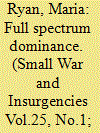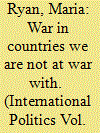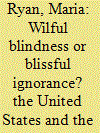|
|
|
Sort Order |
|
|
|
Items / Page
|
|
|
|
|
|
|
| Srl | Item |
| 1 |
ID:
099063


|
|
|
|
|
| Publication |
2010.
|
| Summary/Abstract |
This article challenges the almost universal consensus that post-Cold War neoconservative foreign policy has been characterised by the objective of "exporting democracy" abroad for strategic or moral reasons or both. Instead, the article contends that the touchstone of neoconservatism was the attempt to preserve America's so-called "unipolar moment"-its apparent position as the single pole of power in every region of the world. Moving beyond the abstract and grandiose rhetoric employed by many neocons, the article points out that neocons made a distinction between the respective uses of military and non-military power, arguing that the former should be reserved only for situations where strategic interests were at stake rather than for the sake of ideals. The article goes on to argue that this focus on strategic interests facilitated a close alliance with other conservative nationalists who were also dedicated to maintaining America's position as the single pole of world power. Thus neoconservatism should be analysed and evaluated-by both conservatives and liberal interventionists alike-on the basis that it was a strategy dedicated primarily to preserving American unipolarity, not to the promotion of ideals.
|
|
|
|
|
|
|
|
|
|
|
|
|
|
|
|
| 2 |
ID:
072672


|
|
|
|
|
| Publication |
2006.
|
| Summary/Abstract |
In 2003 the Pentagon's Office of Special Plans employed a hypothesis-based methodology to deliver the now discredited intelligence that justified the Iraq war. The 1976 'Team B', which was also heavily influenced by neoconservatives and used the same methodology, has been recognized as a precedent. There is, however, another precedent, the 1998 Rumsfeld Commission, which challenged CIA predictions on the ballistic missile threat to the US. Lobbied for by many of the same conservatives and neoconservatives, the Commission used the same analytical style as Team B and the OSP. The now discredited intelligence on Iraq was not a 'failure' or 'mistake', but a method, tried and tested by the right, of challenging the CIA on political grounds.
|
|
|
|
|
|
|
|
|
|
|
|
|
|
|
|
| 3 |
ID:
131465


|
|
|
|
|
| Publication |
2014.
|
| Summary/Abstract |
This article examines the evolution of US irregular warfare (IW) doctrine and practice from 2001 onwards. It argues that, after 9/11, top-tier civilian policymakers in the US Department of Defense (DoD) and across the US government developed a heightened awareness of asymmetric threats and non-conventional forms of warfare, especially those shaped by contemporary globalisation. The result was a gradual turn towards irregular warfare, led by Rumsfeld and the DoD, designed to ensure 'full spectrum dominance' across all modes of conflict. This pre-dated the insurgency in Iraq and the promotion of counterinsurgency in the US Army by General David Petraeus and others. Policymakers' reluctance to acknowledge the insurgency in Iraq was not down to a failure to understand the concept of IW, but because they had viewed Iraq in conventional terms for so many years and were reluctant to admit their mistake.
|
|
|
|
|
|
|
|
|
|
|
|
|
|
|
|
| 4 |
ID:
105368


|
|
|
|
|
| Publication |
2011.
|
| Summary/Abstract |
This article examines the origins of the 'Global War on Terror' (GWoT) in peripheral locations; in other words, in countries and regions beyond Iraq and beyond Afghanistan. Although those two countries have remained the 'core' regions of the GWoT, the Bush administration also undertook many other military interventions in countries and regions in ostensibly peripheral locations under the auspices of the 'war on terror'; operations which it referred to in its 2006 Quadrennial Defense Review as 'war in countries we are not at war with'. These include operations in the Horn of Africa, Georgia and the Caspian region, the Philippines and the countries across the Sahara region including Mali, Niger, Chad and Mauritania. This article examines these peripheral theatres in the GWoT and argues that, by its second term, the Bush administration had moved beyond a state-based worldview vis-à-vis terrorism and had truly come to understand it as a transnational problem; a protean network that should be tackled through using Special Operations Forces and unconventional warfare to wage 'war in countries we are not at war with'. The article also considers the extent to which these operations on the 'periphery' were expedient in other ways that often transcended the war on terror because they coincided with the existence of long-standing or newly identified US strategic interests. Finally, the article considers the Obama administration's continuation - and in some cases escalation - of many of the Bush administration's operations in peripheral regions, even as Obama looks to wind down the war in Iraq.
|
|
|
|
|
|
|
|
|
|
|
|
|
|
|
|
| 5 |
ID:
131607


|
|
|
|
|
| Publication |
2014.
|
| Summary/Abstract |
This article examines the successful denuclearization of Iraq by the International Atomic Energy Agency (IAEA) in the early 1990s and the apparent failure of the US Intelligence Community (IC) to rethink its assessments of Saddam's desire for nuclear weapons despite Baghdad's co-operation with the IAEA inspectors, and clear evidence from the Ongoing Monitoring and Verification team that this was a highly successful process. US policy towards Iraq, from the Clinton administration onwards, was hyper-politicized; it relied on a default, unchanging view of Saddam Hussein as a rogue leader bent on WMD acquisition and regional domination in an area that was of vital importance to the United States. The article also considers the impact of the fractious UNSCOM inspections process and argues that this was severely compromised by political intrusion, which was also ignored by the US IC in its assessments of Saddam's intentions. Ultimately, US intelligence on Iraq was filtered for a decade through a hyper-politicized lens that tended to discount evidence from the IAEA that disproved pre-existing assumptions.
|
|
|
|
|
|
|
|
|
|
|
|
|
|
|
|
|
|
|
|
|